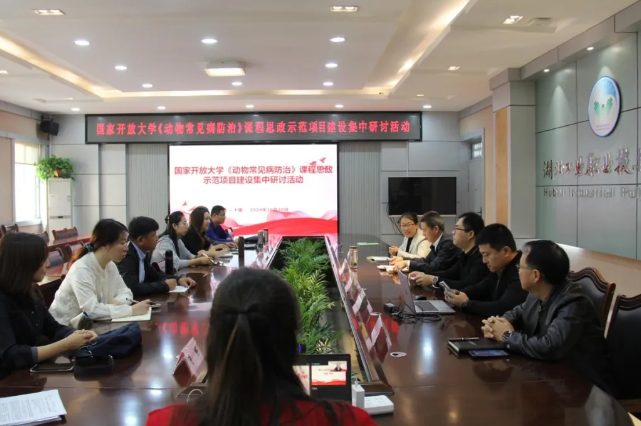 To implement the guiding principles of the Third Plenary Session of the 20th Central Committee of the Communist Party of China (CPC) and the National Conference on Education, further enhance the development of ideological and political demonstration projects for courses, continuously improve the ideological and political construction capabilities and teaching standards of the teaching team, and firmly fulfill the fundamental task of fostering virtue through education, an intensive discussion on the development of the ideological and political demonstration project for the course “Prevention and Treatment of Common Animal Diseases” was recently held in Shiyan City, Hubei Province.
To implement the guiding principles of the Third Plenary Session of the 20th Central Committee of the Communist Party of China (CPC) and the National Conference on Education, further enhance the development of ideological and political demonstration projects for courses, continuously improve the ideological and political construction capabilities and teaching standards of the teaching team, and firmly fulfill the fundamental task of fostering virtue through education, an intensive discussion on the development of the ideological and political demonstration project for the course “Prevention and Treatment of Common Animal Diseases” was recently held in Shiyan City, Hubei Province.
Li Hui, a member of the Party Committee and head of the Organisation Department (United Front Work Department) of the CPC Committee of Hubei Industrial Polytechnic, attended the event. A total of approximately 20 people participated in the activity, including Li Ruifu, vice dean of the Rural Revitalisation College at the Open University of China (OUC), core members of the teaching team for the course "Prevention and Treatment of Common Animal Diseases", and teacher representatives from relevant departments. The event was presided over by Zhao Yanfei, the project leader and a faculty member of the OUC School of Agroforestry and Medicine (Rural Revitalisation College) .

Li Hui introduced the experience and achievements of Shiyan Radio and Television University in integrating resources of the university, government, and enterprises to strengthen collaborative education and facilitate rural revitalisation. Li Ruifu shared the educational achievements of the “One College Student Per Village” programme of the Ministry of Education (MOE) over the past 20 years and discussed the efforts and initiatives of the OUC headquarters in the development of integrating ideological and political education into courses.
Professor Hu Changmin from Huazhong Agricultural University shared experience in integrating ideological and political education development into courses and innovative teaching practices by taking the course "Veterinary Surgery" as an example. He proposed a path to realise the construction of an ideological and political education ecosystem for the course "Veterinary Surgery". Professor Liu Xianyong from China Agricultural University shared his successful experience in applying for the MOE’s ideological and political demonstration courses and detailed how to integrate ideological and political education into the teaching of “Veterinary Parasitology” with specific cases. Professor He Jianzhong from Tarim University introduced the teaching methods of ideological and political education within courses to stimulate students’ interest in learning, ignite their desire for knowledge, and pass on the core ideas of teachers from the four perspectives of “the appeal of course”, “the norm of procedure”, “the value of ideology”, and “the orientation of politics”. Professor Xu Bin from Ningxia Open University (OU, aka Ningxia Polytechnic) focused on strategies for the ideological and political construction of animal husbandry and veterinary medicine courses based on the "in-depth, detailed, and expanded" construction approach. Experts and attendees collectively discussed the experience and practices of incorporating ideological and political education into the course "Prevention and Treatment of Common Animal Diseases", including the writing of ideological and political teaching plan, methods for practical teaching, and resource development.
The discussion group held a round-table meeting with student representatives from the Animal Husbandry and Veterinary Medicine programme at Shiyan Radio and Television University to listen to their suggestions on ideological and political education and practical teaching. Ren Xiaoming, the chief editor and leader of the course " Prevention and Treatment of Common Animal Diseases" and a professor at Beijing Agricultural University, conducted on-site teaching and guidance at the practice teaching base of Hubei Qinba Food Co., Ltd. The discussion group also engaged in collective exchanges.
The teachers all said that the event deepened their understanding of the development of integrating ideological and political education into courses through expert presentations, intensive discussions, and on-site researches. They gained valuable insights and best practices in the construction of course-based ideological and political education, which effectively enhanced their ability to integrate ideological and political education into the instructions of their courses. This has laid a solid foundation for the continued high-quality development of the ideological and political demonstration project of the course "Prevention and Treatment of Common Animal Diseases".
By Wang Di and Zhao Yanfei, OUC